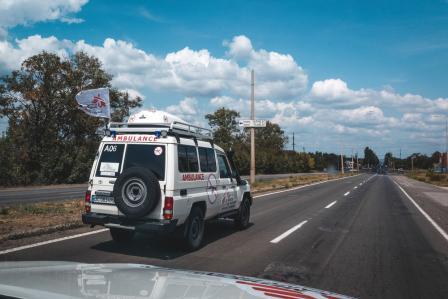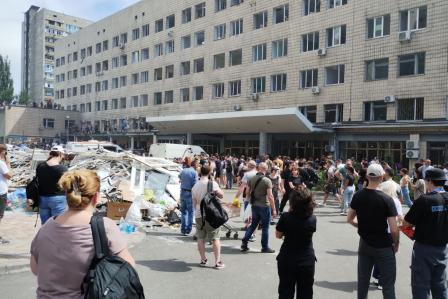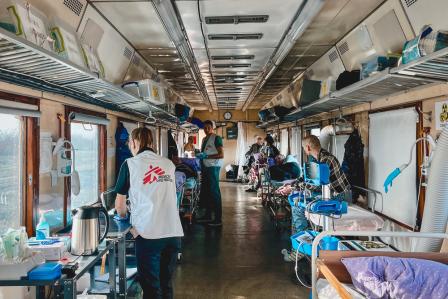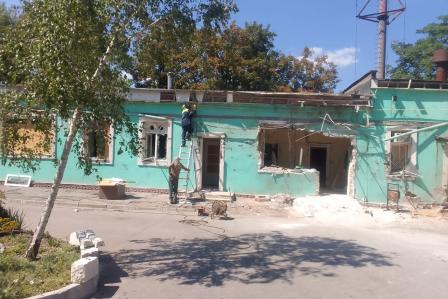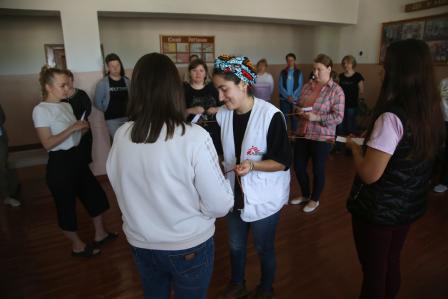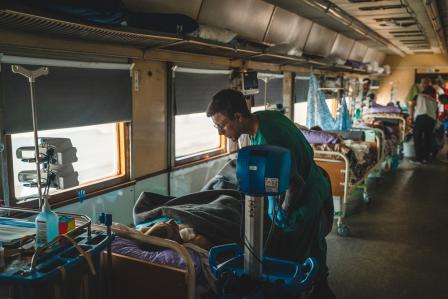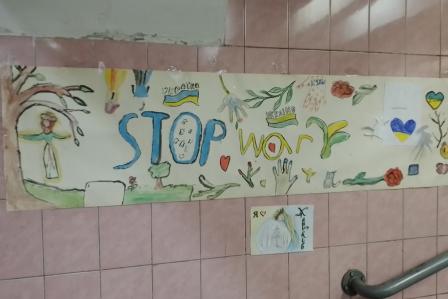Ukraine: in Kharkiv’s underground stations, Doctors Without Borders mobile clinics care for the most vulnerable
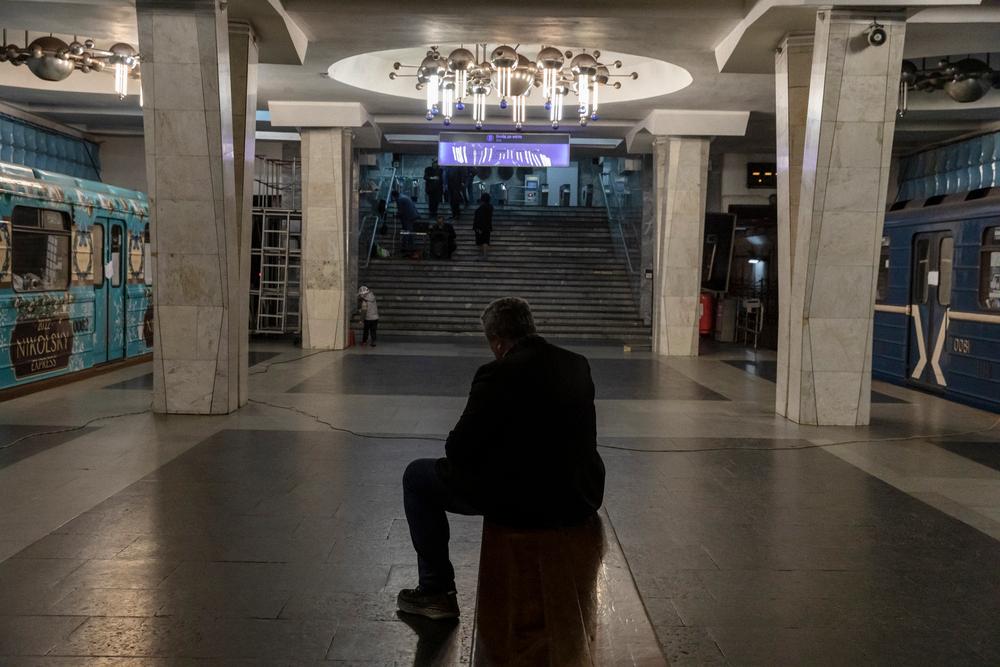
A man sits on a metro bench, between wagons where people now live, hiding from the shelling. Kharkiv, Ukraine, April 11, 2022. © Adrienne Surprenant/MYOP
Since the beginning of the war in Ukraine, Kharkiv, the second largest city in the country, has been severely affected by the Russian offensive. While many fled the city the conflict, those who stayed have taken refuge in underground stations to escape the incessant bombing. Doctors Without Borders / Médecins Sans Frontières (MSF) teams offer primary healthcare consultations in several stations.
Kharkiv had a population of 1.8 million before the war. It has partially emptied over the past few weeks. “The city now looks rather deserted. There are few people in the streets and most stores are closed,” says Michel-Olivier Lacharité, Doctors Without Borders head of mission in Ukraine. “There are still a few pharmacies and markets open so that people can find food, but the main market in Kharkiv is closed."
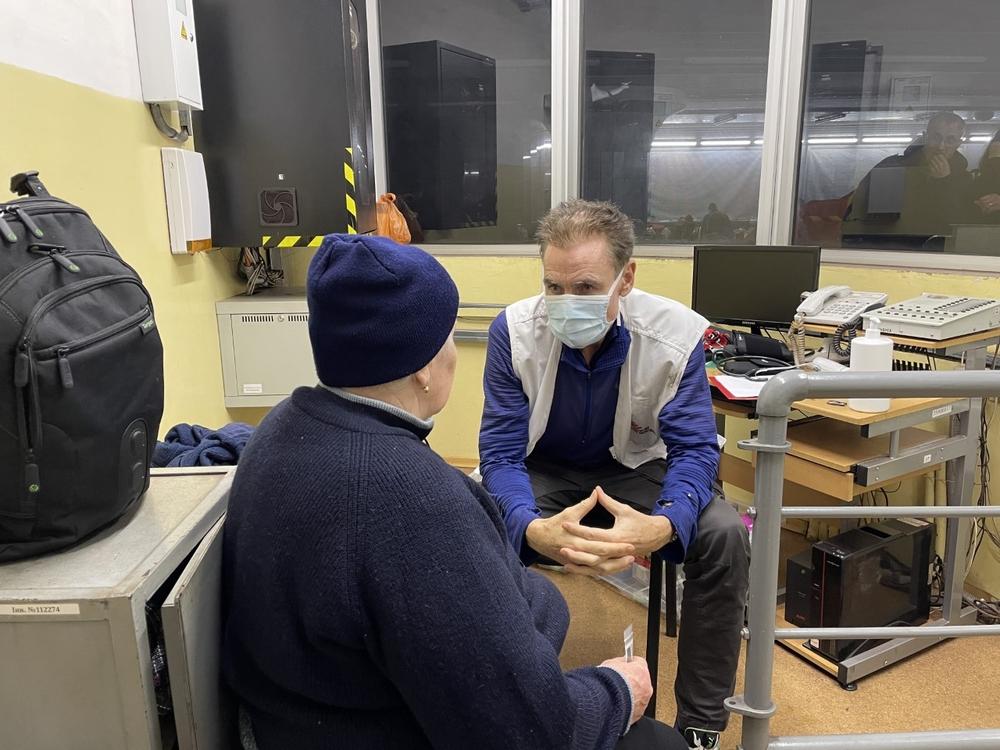
Dr Morten Rostrup, Doctors Without Borders staff, providing medical consultations in a metro station. Kharkiv, Ukraine, April 11, 2022. © Adrienne Surprenant/MYOP
- Read his story
Children who are too afraid to fall asleep, people who feel like they can’t breathe, patients with sky-high blood pressure who risk having a stroke. This is the situation at a metro station in Kharkiv in northeast Ukraine.
“She was sitting on a bench in front of me at one of the metro stations in Kharkiv. Since the war broke out, the stations have functioned as shelters and thousands of people are sleeping on the platforms and in the train carriages. The woman had been thrown out of bed when a rocket hit her apartment building. She had seen her aunt killed a few metres away from her. She couldn’t talk about it but burst into a flood of tears as she sat looking downwards. She was shaking. She wasn’t alone in seeking medical care this evening. There were many others.
A seven-year-old girl who had constant nightmares and was afraid of falling asleep. People experiencing physical pains they couldn’t explain. People who felt like they couldn’t breathe. A woman with sky-high blood pressure who was at risk of having a stroke. An old man who showed me pictures of his three grandchildren. One of the children had been killed in an airstrike two days earlier, the other two were in hospital, one of them critically injured. The children’s father was also killed. The old man had suffered a stroke and had high blood pressure. He couldn’t sleep.
I have had many moving encounters with different people over these past few weeks. Our team from Doctors Without Borders / Médecins Sans Frontières (MSF) travels from one metro station to the next. In the evenings we carry out dozens of medical consultations before pulling out our sleeping bags and spending the night there.
I have seen the despair, the lack of hope, the confusion, the inability to comprehend how they have ended up in this situation: losing family members and friends, losing their homes, losing the future they had envisioned for themselves. I have seen the constant fear experienced by so many, and how some people collapse in terror when the sound of airstrikes fills the air.
Before travelling to Kharkiv, I spent a few days in the city of Vinnytsia, which is located far from the frontline. We wanted to get in touch with Ukrainian psychologists who could assist the displaced people – many with psychological trauma – who were passing through the city on their way to safety in other countries.
This was when I met Olena, a psychologist from Ukraine. Her eyes were blank during our conversation. She had family members in the besieged city of Mariupol and had heard little about how they were doing. Olena said that she couldn’t work now. Before the war, she had worked as a clinical psychologist and treated patients with personal problems. “The patients have stopped coming,” she said. “The problems they had before seem so small now.” Looking at me, she said: “It’s good to meet you. You are so calm. You don’t have the stress and worries that we have. The fact that you are here has a calming effect on us.”
I have worked in many crises and war zones, but I have never heard it so explicitly stated, that our presence has such a significant impact on people. Medical humanitarian work is not only about the concrete help we provide in the form of medicine and treatment, but also about the presence of people from other countries and how they stand alongside the people who are experiencing this crisis at firsthand. Our presence can provide hope, peace and a sense of security. It is a concrete symbol that we care. We are there as fellow human beings, directly and closely. They are not forgotten.
The situation in Kharkiv is very challenging. There are still daily airstrikes. Parts of the city have been levelled to the ground. Half of the population of 1.5 million have fled. Some have chosen to stay, or were unable to escape due to a lack of money, relatives or other contacts, or simply because they were too old or sick to travel. Some of the people we met told us they would rather die in their own city. We assume that many of the most vulnerable people have not left. Many people have lost their homes, especially in the eastern part of the city.
I don’t know how many lungs I have listened to, throats I have looked at and stomachs I have felt. Not because I had a strong suspicion that anything was seriously wrong, but because I knew that a thorough check-up and a conversation acts as reassurance to the patients. Their stress levels are so high that just a small symptom can cause significant anxiety for some patients. When I reassured them that nothing was seriously wrong with them, they thanked me. I saw the relief in their eyes. The fear of becoming sick in these circumstances plagues many, especially the patients with chronic diseases.
It’s easy to forget these victims of the war: the people with increasing mental problems and those who live with chronic diseases. When a war breaks out and they don’t receive follow-up medical care, diseases like these can have potentially devastating consequences. There are patients with cardiovascular disease, lung disease, epilepsy, diabetes, cancer. Some die – in some war contexts, perhaps even more than those who die from injuries caused directly by the violence. Others are forced to flee to a place where they can get the medical care they need, preferably to another country.
Still, it’s encouraging to see how people here are helping each other. At each metro station, small communities have developed. The people sheltering there are well acquainted with each other.
Groups of volunteers work to provide everyone with food and water. A medical student at one of the stations runs a small outpatient clinic and pharmacy. The toilets are cleaned. Everyone in Kharkiv is contributing in their own way. Many contributions are also coming from abroad. We see a very strong sense of unity, but six weeks is a long time, especially when you can’t see a solution in the near future.
It's still cold in the metro stations. It seems that spring will come late to Kharkiv this year.”
Dr Morten Rostrup from Norway is working with Doctors Without Borders in Kharkiv providing medical consultations in the underground stations where people are sheltering. This is his first-hand account of what he saw and of the stories of people he met.
Since the conflict began, the bombing has been continuous, particularly in the northern part of the city. "Bombing still happens all day long, along a seemingly random pattern. Sirens warn people when it happens. There is also a warning system on smartphones. These bells ring several times a day. It is quite anxiety-inducing," Lacharité says.
For the 350,000 people who, according to local authorities, stayed in the city, the underground stations are the safest place. Each station hosts about 100 people during the day, a number that can easily double or triple at night.
There are three lines in the city of Kharkiv, and most, if not all of the stations are in use. Most of the people who live in the underground are elderly or vulnerable. They have been there for more than 40 days in the cold and humidity, sleeping in tents.Michel-Olivier Lacharité,Head of Mission
Doctors Without Borders has set up mobile health clinics in several stations on the three Kharkiv underground lines. Some consultations take place at night. Despite the curfew in the city, the teams can move from station to station through the tunnels. More than 510 medical consultations have already taken place since the beginning of the activities, mainly for respiratory tract infections and hypertension, consequences of the living conditions in the underground system but also of the stress.
Nina, 83, was only a baby during the Second World War. “I am too afraid to leave my city, I have never been abroad. I love Kharkiv too much!” she says with a sad smile. “Its parks, its squares. But the bombs are likely to destroy everything. I am afraid that there will be nothing left but ruins.”
In addition to medical consultations, Doctors Without Borders also offers mental health support. For the young children and adolescents now living in the underground system, the most common stressor is the fear of going out in the open.
"The potential for anxiety-induced behaviour increases as war and instability continue and insecurity becomes a permanent feature of life. Nonetheless, the children here are coping quite well with the extreme situation for now," says Devash Naidoo, Doctors Without Borders mental health activities manager.
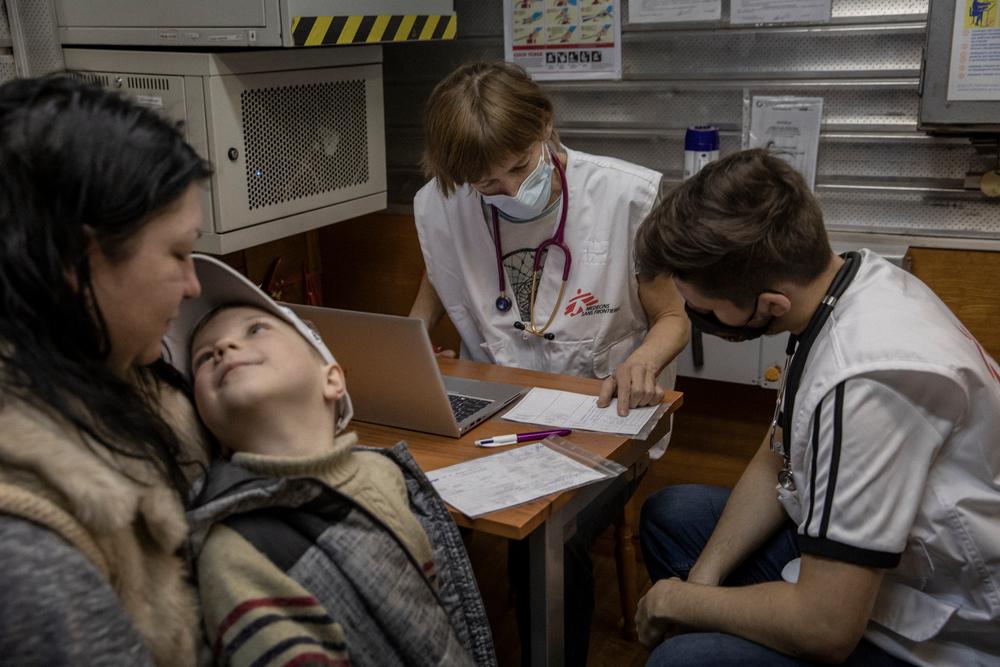
Elena, 35-years-old and her son Kirill, 6-years-old are examined by Kelly and Kirill. Kharkiv, Ukraine, April 11, 2022. © Adrienne Surprenant/MYOP
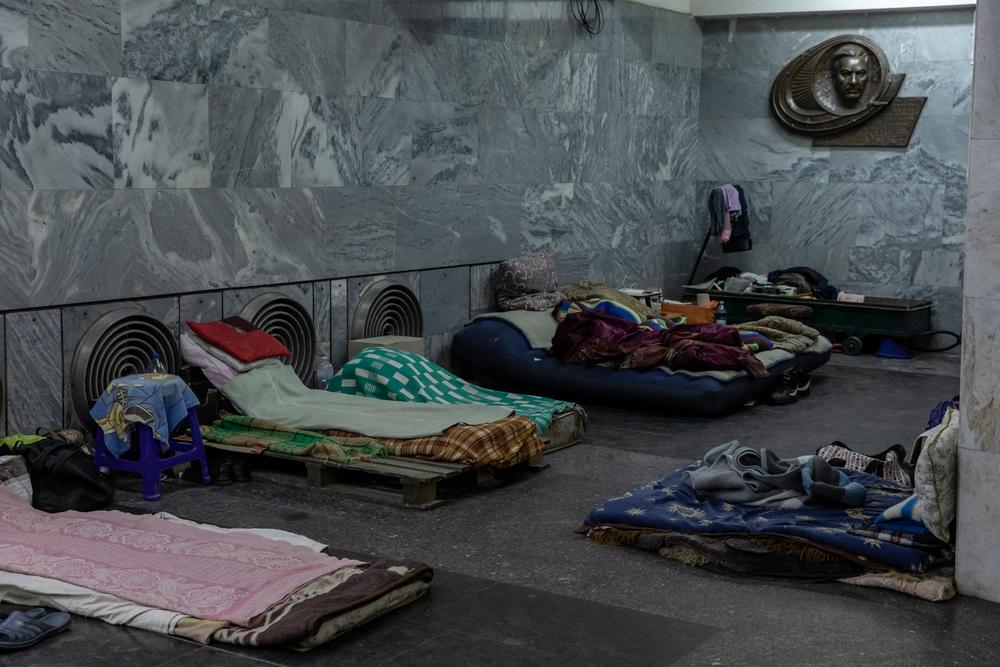
People took shelter in a metro station. Kharkiv, Ukraine, April 11, 2022. © Adrienne Surprenant/MYOP
Doctors Without Borders teams are also distributing much-needed supplies for everyday life: microwave ovens to heat up the food, detergents for cleaning, and water filters to provide drinking water at night. "There are tents and makeshift beds set up all over the place, which means that the sanitary situation in these stations is not always ideal," says Doctors Without Borders doctor Guillaume Mongeau.
Despite the living conditions, for many staying in the underground is the only option. "The cold, the lack of sleep, all this is nothing compared to the war. At least here we are safe," says Ludmilla, 40. She stayed home with her family as long as possible, until an explosion happened near their house. "I was very afraid for my son when I saw him clutching our cat tightly to his chest while he said, 'Mom, I don't want to die.’”

